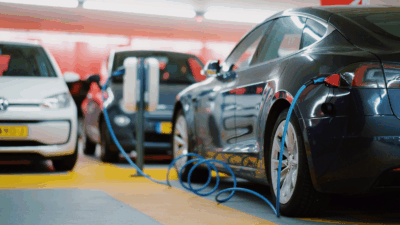
Sign up for smart news, insights, and analysis on the biggest financial stories of the day.
The Environmental Protection Agency is putting a pedal to the electrically-powered metal.
On Wednesday, The EPA proposed a new set of regulations that would require more than two-thirds of all vehicles made in the US to be fully electric by 2032. If adopted, these rules would ramp up the US’ climate strategy, giving automakers nine years to beef up for a market that currently represented 5.8% of all new vehicles sold in the US last year.
Tight 3-point Turn
The EPA’s proposed regulations are intended to set a cap on emissions so tight that automakers would be crazy not to favor EVs over gas-guzzlers. The Biden Administration has set itself a target of reaching net-zero emissions by 2050 and has brought in so many tax breaks for green tech that it’s got US trade partners squawking the subsidies will lure their local talent to America. Not surprisingly, the EPA’s proposed regulations are not especially popular with automakers.
The Alliance for Automotive Innovation, an automaker trade association, said the rules would be trying to cram a “massive, 100-year change to the US industrial base and the way Americans drive” into a little under a decade:
- A major hurdle for converting consumers to EVs is a dramatically insufficient charging network. The Biden Admin wants to hit 500,000 chargers by 2030, a 900% jump from the 50,000 dotted around the country as of last year.
- On average, EVs are also still more expensive than their dinosaur-juice-fuelled brethren, but a combination of government incentives and falling prices for lithium and cobalt could make that problem fade as soon as this year.
American automakers aren’t the only ones feeling the pinch. On Wednesday, a report funded by European aviation lobbying groups found that in order to hit its net zero target by 2050, the industry will need to spend €800 billion on cleaner fuels and new technologies.
And Now For A Change, Some Good News: While automakers and aviators may be bemoaning the speed at which they’re expected to stop polluting the planet, the world’s overall fossil fuel usage may actually have peaked. A study from energy analysis group Ember found renewables generated a record 12% of global electricity this year, and could satisfy all growing demand as soon as this year.











